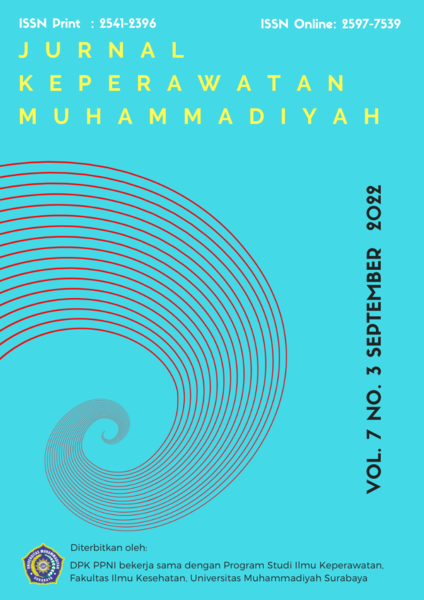GAMBARAN KEJADIAN WANITA DENGAN DOUBLE BURDEN DI KABUPATEN BANGKALAN
DOI:
https://doi.org/10.30651/jkm.v7i3.17674Keywords:
double burden, gender discrimination, womenAbstract
Double burden (double loading) is a form of gender discrimination that occurs in a woman in the division of roles, when the women have two roles as housewives and career women. The purpose of this study is to describe of women with a have double burden.
Design research using descriptive method with sampling technique is simple random sampling. Sample in this study were all married women, have husband and children in Perumahan Daerah (PERUMDA) RT / OO1 / RW / 003Mlajah Village Bangkalan with a total population 73 women and a sample of 61 women. The variable in this study was the occurrence of double burden. Data collection instrument used primary and secondary data by using the data questionnaire. Data processing used editing, coding, scoring and tabulating steps.
The result showed that the majority of women who do not have a double burden are 49 women (80,3 %) andwomen who have double burden are 12 women (19,7%).
Therefore, women are expected to be able to divide time (time management) to perform the role as housewivesand career women. Career women are also responsible for housekeeping. Women with working hours which does not exceed the time limit set by labor department (DEPNAKER) ranging from 7-8 hours per day. Women who work beyondthe working hours that have been determined by DEPNAKER, means they are in the overtime.
References
Ana, S. 2012. Bentuk Ketidakadilan Gender dalam Keluarga. Tersedia dalam http://black-hana-165.blogspot.com/2012/11/contoh-bentuk-ketidakadilan-gender.html. diakses pada 05 Maret 2015.
BKKBN. 2007. Keluarga Berencana dan kontrasepsi. Cetakan ke-5. Jakarta. Pustaka sinar harapan.
Badan Pusat Statistik (BPS, 2011), diakses dari http://www.bps.go.id/. Diakses pada tanggal 13 Januari 2015
Badan Pusat Statistik (BPS, 2012), diakses dari www.kemenpppa.go.id/v3/index.PHP/data-summary/profil-perempuan-indonesia/634.ketenagakerjaan. diakses pada tanggal 20 Januari 2015
Badan Pusat Statistik (BPS, 2013), diakses dari www.dinkes.kota semarang.go.id/?P=kegiatan_mod&j=lihat&id=146. Diakses pada 20 Januari 2015
Fakih, M. 2006. Analisis Gender dan Transformasi Sosial. Yogyakarta: Pustaka Pelajar.
Handayani, L., Wildan, W., & Bahry, R. (2021). BIAS GENDER DALAM NOVEL SABIL DAN CUT NYAK DIEN KARYA SAYF MUHAMMAD ISA. Master Bahasa, 9(1), 522-529.
Hassanatunajjah, E., Dja’far, H., & Ruslan, M. (2020). PERAN GANDA PEREMPUAN DALAM MENINGKATKAN EKONOMI KELUARGA DI DESA MEKAR JAYA KECAMATAN BAYUNG LENCIR (Doctoral dissertation, UIN Sulthan Thaha Saifuddin Jambi).
Jawas, Y. 2006. Bingkisan Istimewa Menuju Keluarga Sakinah. Bogor-Jawa Barat: Pustaka At-Taqwa.
Jufrizal, O. A. 2013. Askeb Komunitas Beban Ganda. tersedia dalam http://arnandhajufrizal.blogspot.com/2013/09/askeb-komunitas-beban-ganda. html. diakses pada 31 Oktober 2014.
Oktaviani, O. (2021). Peran Wanita Karir Dalam Pemenuhan Nafkah Keluarga Dalam Masyarakat Bugis Di Kota Parepare (Analisis Gender Dan Fiqh Sosial) (Doctoral dissertation, IAIN Parepare).
Sulaswatty, A. 2009. Diskriminasi gender. Tersedia dalam www.ristek .go.id/?module=news%20news&id=3367. Diakses pada 05 Maret 2015.
Sekar, A. 2009. Wanita karir. Tersedia dalam http://amaliasekar.com/tag/wanita-karir/. Diakses pada 09 Agugtus 2015.
Sastriyani, S. H. 2005. Woman in Public Sector (Perempuan Di Sektor Publik). Yogyakarta: Pusat Studi Wanita UGM.
Sarina, Ahmad, R S. 2021. Diskriminasi Gender Terhadap Perempuan Pekerja Di Kawasan Industri Makassar. Makassar. Pinisi Journal Of Sociology Education Review
Tri, W. 2013. peran wanita sebagai seorang istri dalam pandangan masyarakat umum. Tersedia dalam http://wiwit_tri-fisip13.web.unair.ac.id/artikel_detail-89209-Pengantar%20Sosiologi-Makalah%20Peran%20Wanita%20dalam%20Sektor%20Publik.html. Diakses pada 24 Februari 2015
Tuwu, D. (2018). Peran pekerja perempuan dalam memenuhi ekonomi keluarga: dari peran domestik menuju sektor publik. Al-Izzah: Jurnal Hasil-Hasil Penelitian, 13(1), 63-76.
Downloads
Published
Issue
Section
License
- Penulis tetap memegang hak atas karyanya dan memberikan hak publikasi pertama kepada jurnal ini yang secara simultan karya tersebut dilisensikan di bawah:Â Creative Commons Attribution-ShareAlike 4.0 International (CC BY-SA 4.0)













